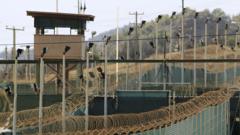The transfer of 11 men from Guantánamo Bay to Oman, completed just before a pivotal legal event involving Khalid Shaikh Mohammed, signifies the lowest number of prisoners housed at the facility since its inception. Released individuals had faced no charges prior to their transfer, part of a broader initiative to potentially close the detention center.
U.S. Transfers 11 Guantánamo Prisoners to Oman, Reducing Detention Numbers

U.S. Transfers 11 Guantánamo Prisoners to Oman, Reducing Detention Numbers
The Pentagon has successfully moved 11 Yemeni detainees from Guantánamo Bay to Oman, marking a significant reduction in the prison population under the Biden administration.
In a notable shift in U.S. prison policy, the Pentagon announced on Monday that 11 Yemeni prisoners were transferred from Guantánamo Bay to Oman, resulting in only 15 detainees remaining at the facility. This transfer is part of a broader effort by the Biden administration to downsize the historic detention center, which has housed suspects since 2002. Significantly, none of the released individuals were charged with any crimes during their lengthy detainment.
The maneuver, completed in the early hours of Monday, comes just days ahead of a highly publicized court appearance by Khalid Shaikh Mohammed, who is slated to plead guilty to his role in orchestrating the September 11 attacks, in exchange for life imprisonment rather than facing a death penalty trial. This timing reflects a broader strategy to facilitate the closure of the detention center, a goal initially sought during the Obama presidency, but which experienced setbacks during Biden's term due to congressional resistance.
Among those released was Moath al-Alwi, whose artistic endeavors at Guantánamo garnered attention, and Abdulsalam al-Hela, known for his testimony related to the U.S.S. Cole attack. All detainees were cleared for transfer after rigorous evaluations by national security review boards.
While details regarding the terms of the agreement with Oman remain undisclosed, this transfer is consistent with U.S. legal prohibitions against returning detainees to Yemen, where ongoing civil conflict presents significant risks for monitoring and rehabilitation. The successful execution of this secret operation underlines an ongoing commitment to reevaluating U.S. military detention policies in the face of evolving geopolitical contexts.




















